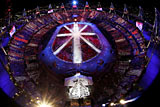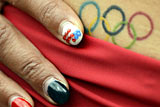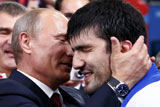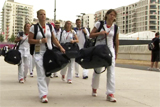
London looks to get ahead of disease threat
Updated: 2012-05-31 14:40:51
( Agencies)
|
|||||||||||
LONDON - If someone's stomach is churning and cramping after eating a burger or club sandwich from a pop-up vendor at the London Olympics, Brian McCloskey plans to be among the first to hear about it.
As the man in charge of disease surveillance during the Games, he says the greatest risk will be food poisoning from people eating street snacks in warm weather, failing to wash their hands and using the same toilets as millions of others.
But he has a strategy to get ahead of the threat.
McCloskey's Health Protection Agency Olympic co-ordination centre (OCC) will gather data on a daily basis - not only on confirmed cases of diseases such as measles, meningitis, salmonella and flu, but also on the stomach cramps, coughs, headaches and fever symptoms people complain of when they go to walk-in clinics or emergency rooms.
"It's called syndromic surveillance, and it's kind of a speciality of the UK," McCloskey told Reuters in an interview.
The idea is that as well as waiting for doctors to officially diagnose and report a specific illness up the data chain, a process that may take days, McCloskey's team will get prior warning by assessing symptoms early.
"Most people don't go to a doctor or hospital emergency rooms saying they've got pneumococcal meningitis or measles, they walk in and say they've got diarrhoea and vomiting, or a temperature, a sore throat and a headache," he explains.
"We record those symptoms, or syndromes, and we analyse the data on a regular basis to look for changes to normal patterns."
The Olympic and Paralympic Games are set to be one of the largest mass gatherings Britain has handled, with 8 million Olympic and 2 million Paralympic tickets being sold to spectators from all parts of the country and across the world.
More than 10,000 athletes from more than 200 countries will take part in events starting on July 27 with the opening ceremony and then spreading across 34 different venues.
Little surprise then that the Olympics pose significant public health risks and McCloskey is eager to get ahead.
"The main thing is to know what's happening," he adds. "That's our key job, putting in place the surveillance systems which will tell us whether anything unusual is happening. Then our response will be to see what we can do to control it and reduce the spread."
With something like flu, for example, McCloskey says syndromic surveillance could give an alert "about two weeks earlier than that normal case reporting systems do."
"If a new strain of flu were to emerge, or something like SARS (Severe acute respiratory syndrome), that would be something we'd take very seriously.
"There isn't any evidence of it happening (in previous Olympics), but it's a possibility so it's one of the things we're on the look-out for."
Mass gathering medicine??
Mass gatherings, be they sporting events, religious pilgrimages or rock festivals, can be hotbeds of disease. They have even inspired the creation of a whole new academic scientific discipline called "mass gathering medicine".
The subject was at the heart of a series of papers published recently in The Lancet Infectious Diseases journal in which experts warned that conventional concepts of disease spread and crowd control were often inadequate.
"Mass gathering have been associated with death and destruction - catastrophic stampedes, collapse of venues, crowd violence and damage to political and commercial infrastructure," Ziad Memish, deputy health minister of Saudi Arabia, which each year hosts the haj pilgrimage, wrote in one of the papers.
McCloskey said the haj is a useful gathering to look at and learn from, but he noted many differences between the pilgrimage and the Olympics that are crucial when it comes to disease risk.
"In the haj ... you have 2 million people travelling together, eating together, sleeping in the same tent for anything from six days to two weeks, so there is very close contact for prolonged periods," he said.
At an Olympics, while the numbers are greater, they are also more spread out and contacts tend to be minimised to a few hours in the middle of the day. Prior Olympics experiences suggests major infections do not happen often.
"We're fairly confident we have the right systems in place to know if anything is happening, and we have the right resources to respond if it does happen," McCloskey said.
"But the balance of the evidence available to us is that the most likely thing to happen is nothing at all."?
Medal Count |
||||
| 1 | 46 | 29 | 29 | |
| 2 | 38 | 27 | 22 | |
| 3 | 29 | 17 | 19 | |
| 4 | 24 | 25 | 33 | |
| 5 | 13 | 8 | 7 | |
| 6 | 11 | 19 | 14 | |















